There's a lovely rhythm to old Irish sayings, words that carry more than their literal meaning, since they hold a glimpse into the way our ancestors saw the world.
One such gem is "Mac an ghortacáin a dhéanann flaisc" (pronounced phonetically as Mock on GHURT-a-cawn a YAY-nun FLASHK), which translates as "The son of the miser is usually a spendthrift."
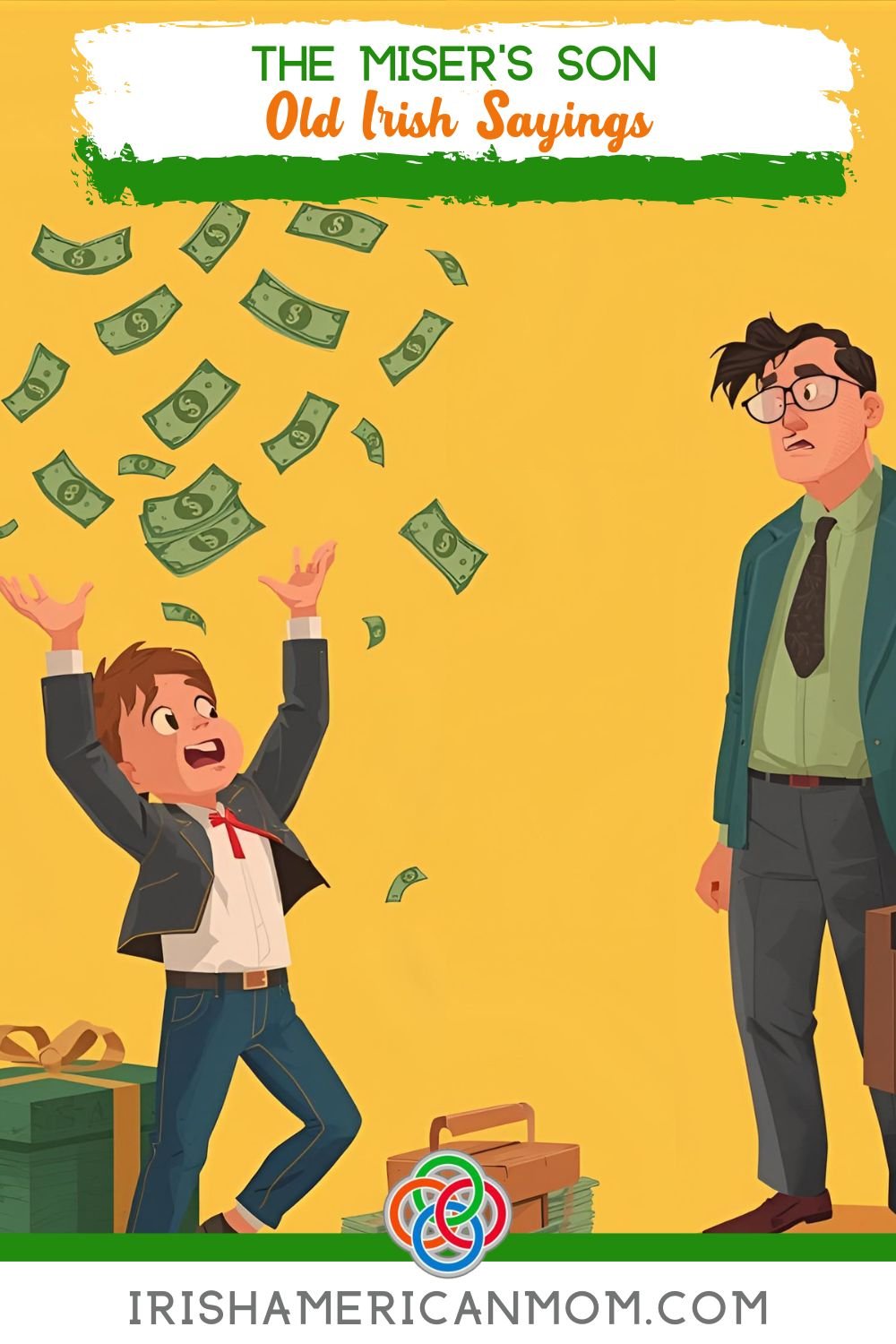
This little proverb reminds us how habits of money and living often swing like a pendulum from one generation to the next. My mother expresses this fact with the old saying, "after the gatherer, comes the scatterer."
Where one person might cling tightly to every penny, the child who follows may scatter coins to the four winds, never knowing the pinch of want that shaped their parent's choices. This old saying speaks of balance, of lessons learned and sometimes forgotten, and of the eternal dance between saving and spending.
Table of Contents
Literal Meaning and Translation
Let's take a closer look at the words themselves:
Mac (Mock) = "son."
An ghortacáin (on GHURT-a-cawn) = "miser" or someone overly tight-fisted with money.
Flaisc (FLASHK) = "spendthrift," a person who wastes or squanders.
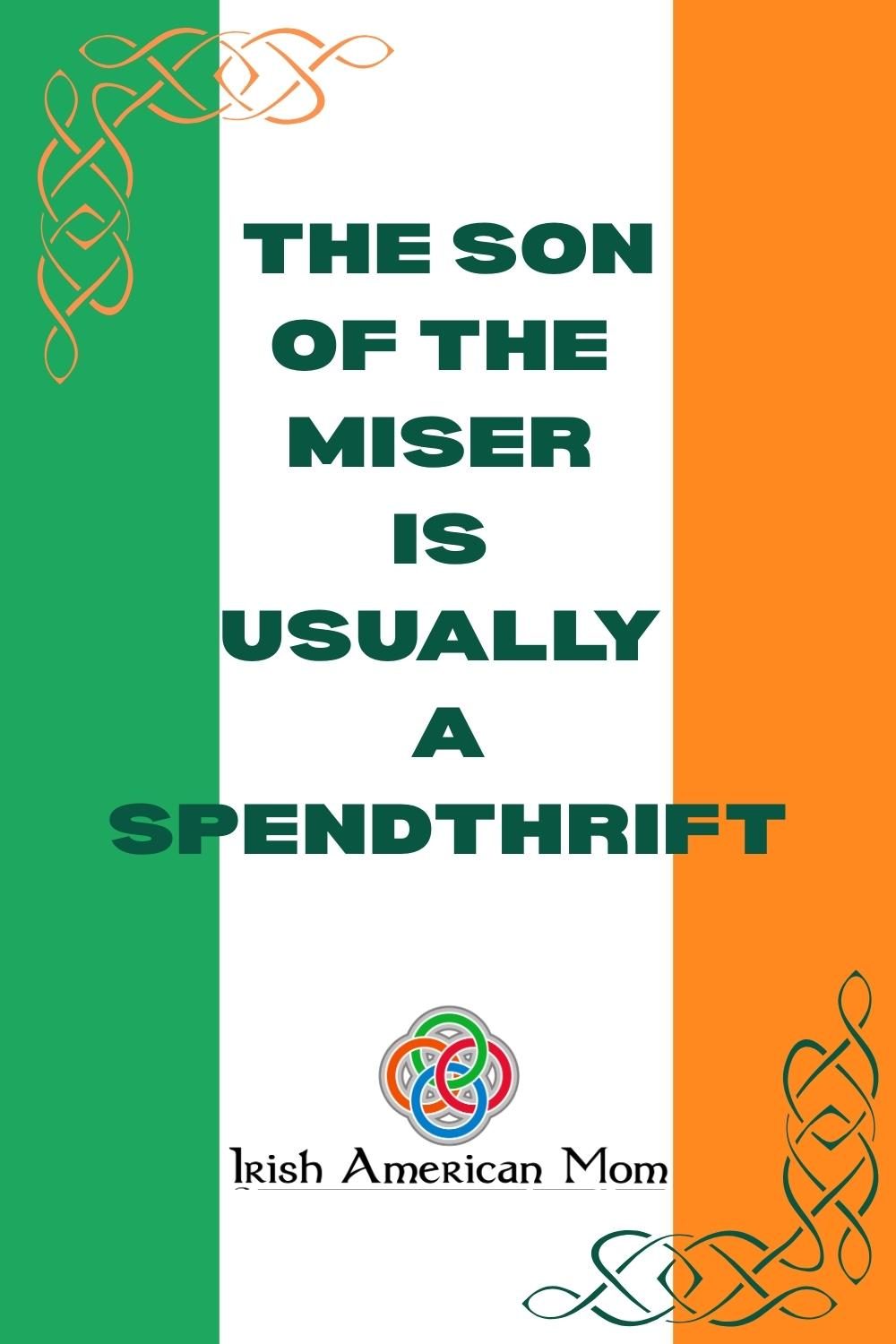
So, in its simplest form, the proverb tells us: The son of the miser often grows up to be the opposite - wasteful and extravagant.
The Irish language has a wonderful way of capturing a full human truth in just a few short words. With one neat phrase, we glimpse a family story of thrift, want, and plenty.
Cultural and Historical Context
In old Ireland, thrift was not a choice but a necessity. Most families lived off the land, making do with little, patching clothes until they could no longer hold a stitch, and stretching food to last until the next harvest.
There was even a phrase, "bia beag, buíochas mór" ( phonetically said as Bee-a BUH-UG, BWEE-uh-kus more), meaning "a little food, great thanks." This reflects extreme gratitude for even the smallest portion.
Yet, as with all things, when saving turned into hoarding, it was seen as a flaw. The miser might be judged for denying himself and his family even small comforts in the pursuit of keeping a few coins safe. And then, inevitably, the next generation, not knowing hunger or hardship in the same way, might squander the savings in a rush of spending, undoing years of tight-fisted living.
This proverb was a gentle reminder to the community that balance is key.
Folklore and Storytelling
Irish folklore and storytelling are filled with little cautionary tales about wealth and its passing from hand to hand.
One such expression was "fonn airgid" (phonetically pronounced as Funn ARR-ig-ud), meaning "a desire for money." A man with too much fonn airgid might never enjoy life's blessings, keeping every coin hidden.
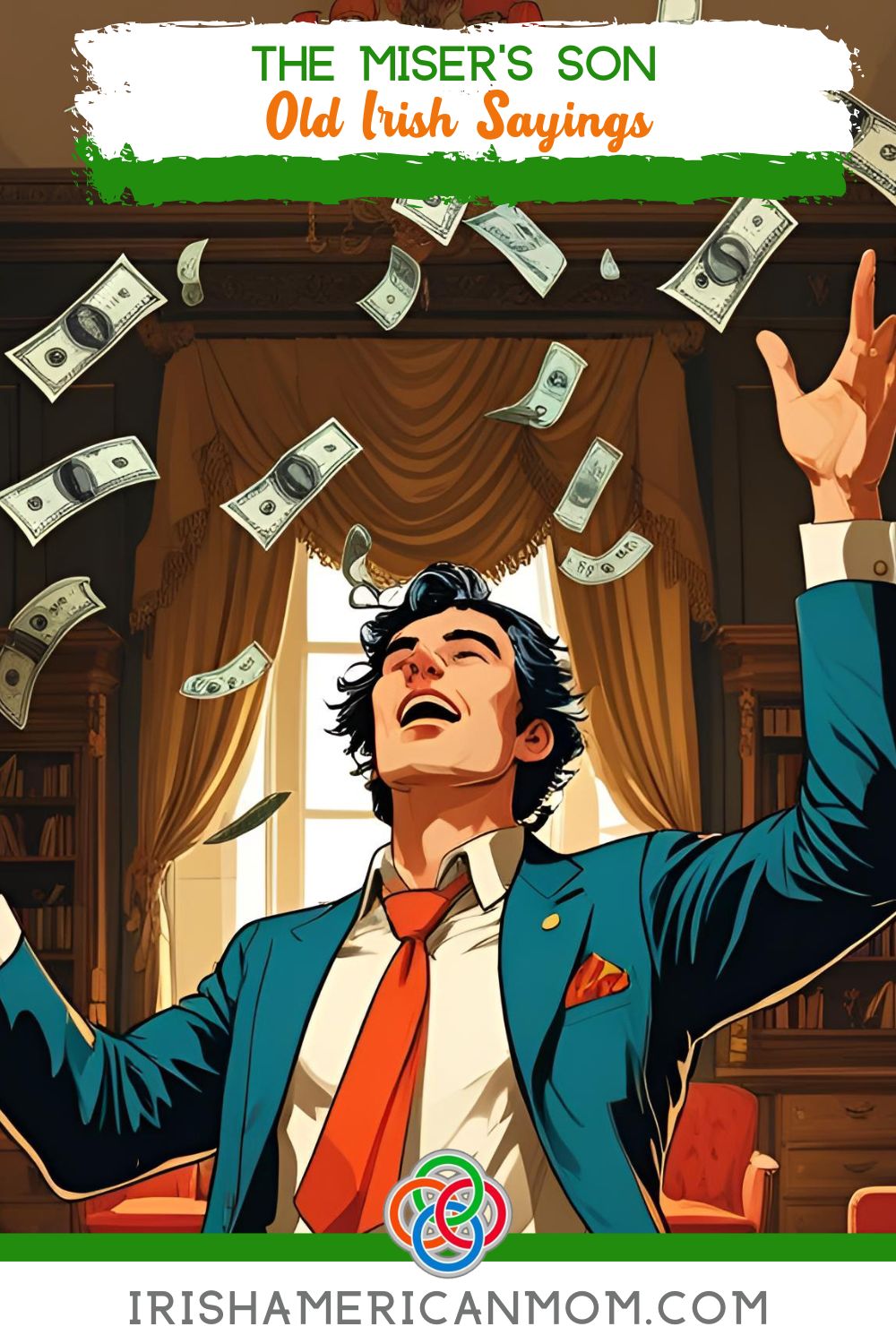
A common fireside tale told of a farmer who saved every penny, denying himself meat at the table and a warm coat in winter. When he died, his son inherited the farm and promptly spent the money on horses, fine clothes, and nights out, until nothing was left but debts.
Tales like this would have been told with a shake of the head and a knowing smile, reinforcing the wisdom behind the proverb. The Irish tradition didn't simply scold the miser or the spendthrift, it reminded listeners of the dangers that lie in both extremes.
A Universal Lesson
This Irish saying finds its echo in other cultures. In America, we say, "Shirtsleeves to shirtsleeves in three generations." In England, there's, "Clogs to clogs in three generations."
The wisdom here is not about money alone. It's about balance. Life asks us not to clutch so tightly that joy is lost, nor to spend so wildly that security is squandered.
In the Irish language we warn not to be "ró-ghar don sparán" (phonetically pronounced as Row GAR dun spar-AWN) and which translates as being "too close to the purse." The lesson is that in moderation true contentment lies.
Relevance Today
Though this proverb comes from a very different world and time, it still rings true today.
How often do parents try to teach children the value of money, only to see them rush to spend as soon as they have their own?
In today's consumer-driven culture, the pull toward waste and extravagance is even stronger.
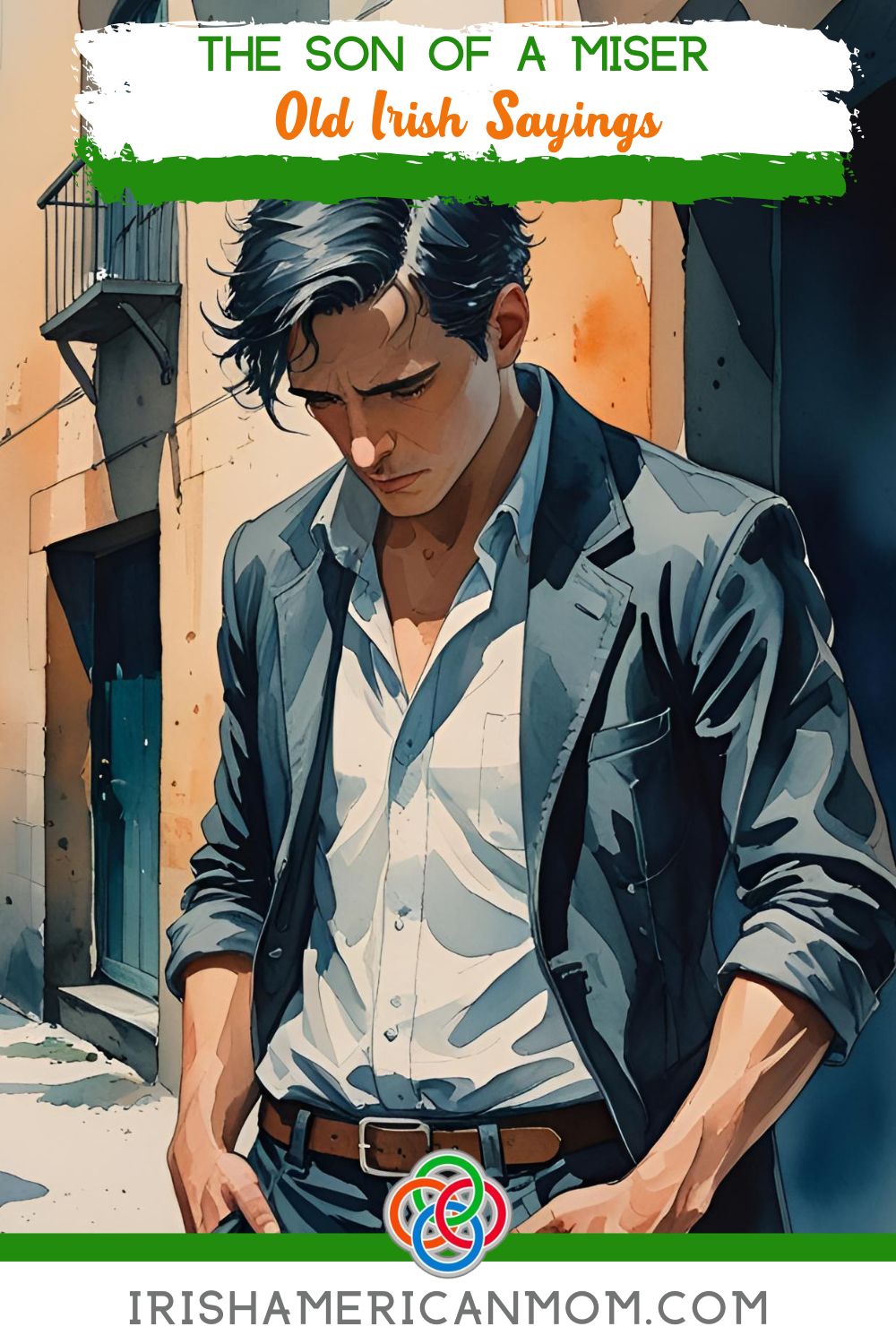
At the same time, we also know the dangers of miserliness, never allowing ourselves small pleasures, always worrying about what might be lost.
This old Irish wisdom invites us to find a middle path: save wisely, but don't forget to live a little.
Or as the Irish would say, "Beatha teanga í a labhairt" ( phonetically pronounced as BAH-hah TANG-ah ee a LOU-wurt), meaning "the life of a language is to speak it," and by extension, the life of money is to use it, not bury it.
Closing Reflection
"Mac an ghortacáin a dhéanann flaisc."
(Mock on GHURT-a-cawn ah YAY-nun FLASHK).
The son of the miser is usually a spendthrift.
These few Irish words remind us that extremes rarely bring happiness. The miser misses out on life's joys, while the spendthrift risks losing security and peace of mind.
Our ancestors, with their gift for observation and wit, left us sayings like this to guide us, providing verbal little nudges toward balance and moderation.
Do you have stories in your own family of thrifty parents and free-spending children? Or perhaps the opposite, careful savers who passed along wise habits to the next generation? I'd love to hear your thoughts and reflections in the comments.
Thanks for following my recipes and ramblings.

Slán agus beannacht,
(Goodbye and blessings)
Mairéad -Irish American Mom
Pronunciation - slawn ah-gus ban-ock-th
Mairéad - rhymes with parade
Wise Old Words
- Every Man Is Sociable Until A Cow Invades His Garden
- Why the Irish Have a Way with Words: Quotes That Make You Feel Seen
- He'd Peel An Orange In His Pocket
- He Wouldn't Spend Christmas
Blessings
- May The Road Rise To Meet You Irish Blessing Plate Day Twelve Gift
- Irish Wedding Blessings
- Irish Rainbow Blessings
- Irish Christmas Blessings










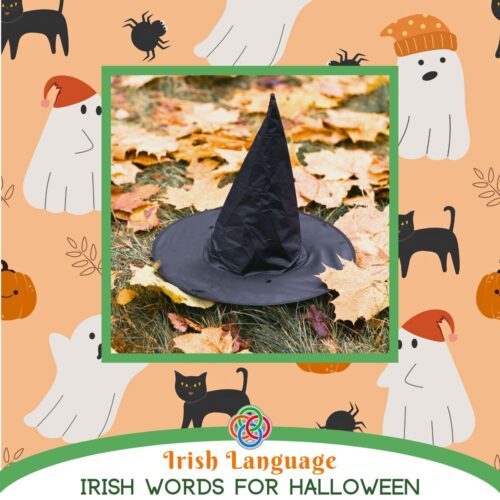





Leave a Reply